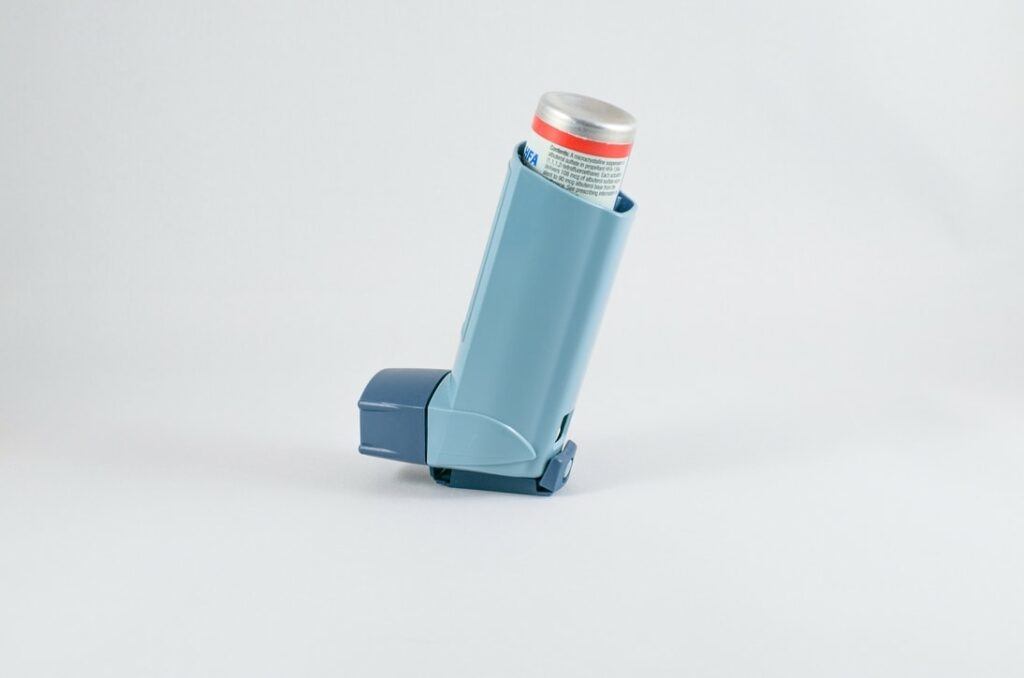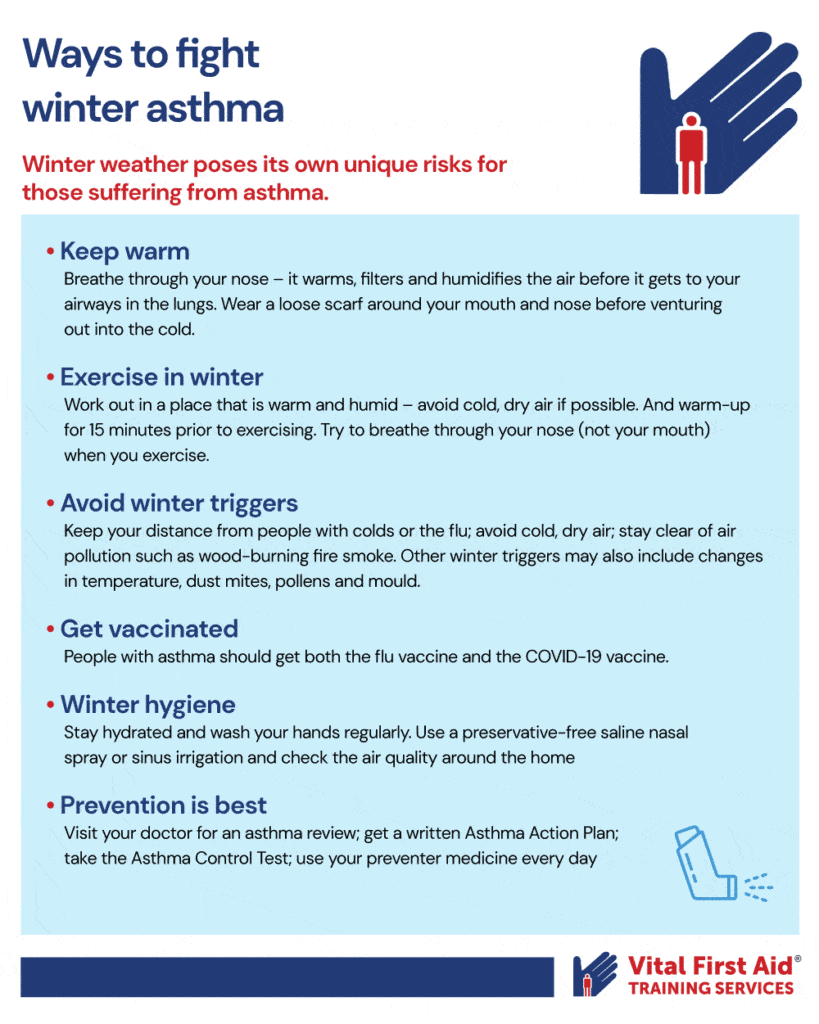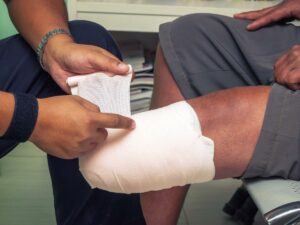Winter weather poses its own unique risks for those suffering from asthma.
Asthma is the sixth-most common health condition in Australia, and many people often go undiagnosed until they experience an attack.
In this blog, we explore what to look out for in winter and ways to prevent and treat asthma attacks using first aid.
Whether you have been diagnosed with asthma, know someone with the illness, or are currently unaware of the condition, learning the warning signs and providing asthma first aid is an essential skill to have.
Why Does My Asthma Get Worse In Winter?
Many asthmatics experience asthma symptoms and asthma flare-ups in winter due to the cold, dry air. As the temperature drops, the Australian Institute of Health and Welfare says children and adults are more likely overall to be taken to hospital due to asthma.
The low level of moisture in the air and the cold are believed to be partly responsible. Additionally, winter brings other potential triggers, such as flu, colds, viruses, dust, moulds, and worsening air quality due to wood-burning heaters and open fires.
Ways To Fight Winter Asthma
- KEEP WARM – Breathe through your nose – it warms, filters and humidifies the air before it gets to your airways in the lungs. Wear a loose scarf around your mouth and nose before venturing out into the cold. Cold air can trigger asthma symptoms when it enters your airways, so this will prevent that from happening.
- EXERCISE IN WINTER – Work out in a place that is warm and humid – avoid cold, dry air if possible. And warm-up for 15 minutes prior to exercising. Try to breathe through your nose (not your mouth) when you exercise – this makes the air warm and moist when it reaches your lungs.
- AVOID WINTER TRIGGERS – Keep your distance from people with colds or the flu; avoid cold, dry air; stay clear of air pollution such as wood-burning fire smoke. Other winter triggers may also include changes in temperature, dust mites, pollens and mould.
- COVID-19 AND ASTHMA – People with asthma should get both the flu vaccine and the COVID-19 vaccine. However, the Department of Health recommends spreading the vaccines apart by at least two weeks. For more information on this question, speak with your doctor.
- WINTER HYGIENE – Stay hydrated and wash your hands regularly. Use a preservative-free saline nasal spray or sinus irrigation and check the air quality around the home, as well as use winter heating options that won’t make things worse for your asthma.
- PREVENTION IS BEST – Visit your doctor for an asthma review; get a written Asthma Action Plan; take the Asthma Control Test; use your preventer medicine every day (even when feeling well); check your spacer device technique; learn the steps of Asthma First Aid, get vaccinated and stock up on Vitamin D.
Remember, for good control of asthma you need:
• medicines – taken the right way, at the right time
• regular medical visits for check-ups and to learn more about living with asthma
• an action plan, so you know exactly what to do when symptoms happen.
Asthma Emergency First Aid
In the event of an asthma attack, use these ‘FOUR’ RULES when you administer first aid.
- Sit the person upright. Reassure the patient and keep calm yourself.
- Give FOUR SEPARATE PUFFS of blue reliever puffer. Make sure you shake the puffer, put one puff into a spacer at a time and get the person to take FOUR BREATHS of each puff through the spacer. Remember: shake, one puff, FOUR BREATHS.
If you don’t have a spacer, simply give the person FOUR PUFFS of their reliever (one puff at a time, four breaths between puffs) directly into their mouth. Repeat this until the person has taken FOUR PUFFS.
- Wait FOUR MINUTES. If there is no improvement, give FOUR more SEPARATE PUFFS as in step 2. Remember: shake, one puff, FOUR BREATHS.
- If there is still no improvement, call triple zero (000) for an ambulance. Tell the operator that someone is having an asthma emergency.
Keep giving the person FOUR separate puffs of reliever medication, taking FOUR breaths for each puff, every FOUR minutes until the ambulance arrives.
In the case of an asthma attack that is not clearly identified, you can still use blue reliever medication since you are unlikely to cause harm.
Call triple zero (000) immediately if:
- The person is not breathing;
- Their asthma suddenly becomes worse;
- The person is having an asthma attack and there’s no blue reliever medication available.
Asthma Statistics in Australia
- 2.7 million (11%) Australians have asthma
- In 2018, there were 389 deaths due to asthma in Australia
- Women 15 yrs and over are 2.3 times more likely to be admitted to hospital than men
- Only 24% of asthma sufferers have an action plan in place
Asthma Australia Resources
Where To Get Help
- In an emergency, always call triple zero (000)
- Emergency department of your nearest hospital
- Your GP (doctor)
- National Home Doctor Service Tel. 13 SICK (13 7425)
- Asthma Australia Tel. 1800 ASTHMA (1800 278 462)
- National Asthma Council of Australia Tel. 1800 032 495
- Allergy and Anaphylaxis Australia Tel. 1300 728 000
Asthma Organisation Links
- New South Wales Health (PDF)
Asthma Treatment FAQs
What do you do if there’s no inhaler?
Sit up straight. Remain calm. Focus on your breathing. Try these breathing techniques: Buteyko, Papworth, pursed-lip breathing, belly breathing, yoga breathing. Move away from any likely triggers. If things get worse and you start to feel drowsy, call 000 immediately.
Is it dangerous to overuse a rescue inhaler?
Asthma sufferers should only use a rescue inhaler when they experience asthma symptoms. Maintenance medication isn’t replaced by it. If you are prescribed albuterol, your doctor will provide specific instructions regarding when to use it and how. Follow their instructions carefully at all times.
What are the main triggers for an asthma attack?
- Pollen, dust, mould, pet hair
- People with the common cold
- Cold air
- Smoke
- Some drugs, like aspirin, beta-blockers, ibuprofen
- Stress
- Preservatives in foods and drinks
Vital First Aid gives you the skills and knowledge needed to assist in almost any emergency situation involving first aid, including asthma attacks. Learn first-aid from professional paramedic trainers with over 25 years’ experience in the industry.
View all our courses | Book online today







